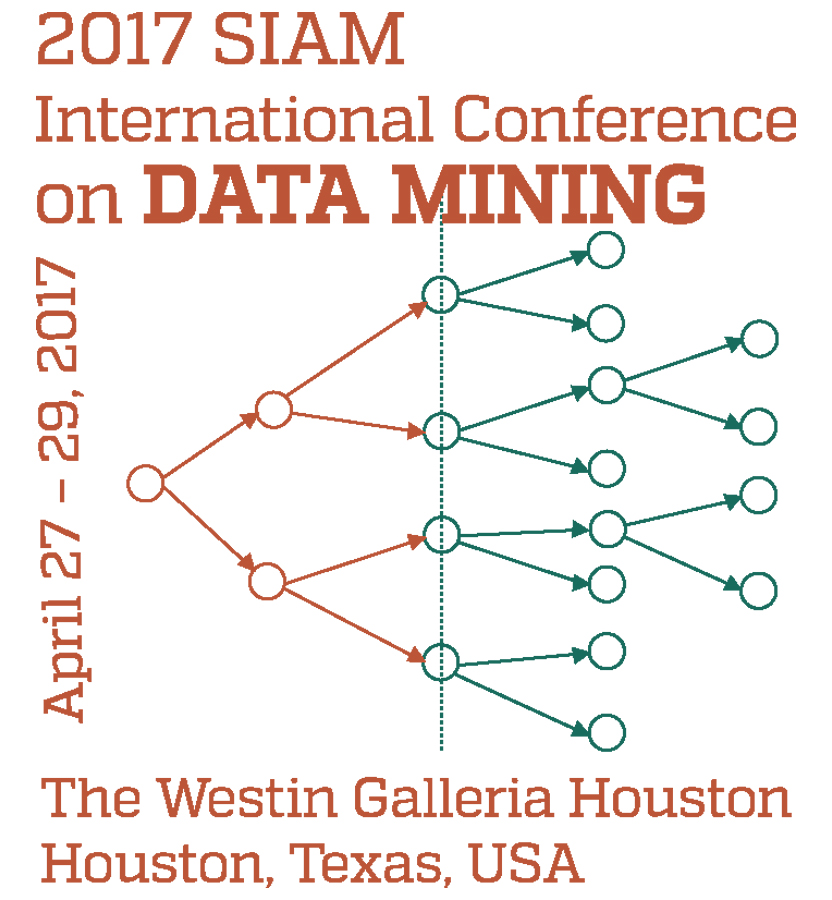MLRec 2017
3rd International Workshop on Machine Learning Methods for Recommender Systems
In conjunction with 17th SIAM International Conference on Data Mining (SDM 2017)
April 27 - 29, 2017, Houston, Texas, USA
Following the success of the last editions of MLRec in
2015 and
2016,
the third edition of the MLRec workshop focuses on developing novel, and applying existing
Machine Learning (ML) and Data Mining (DM) methods to improve recommender systems.
This workshop also highly encourages applying ML-based recommendation
algorithms in novel application domains (e.g., precision medicine), and
solving novel recommendation problems formulated from industry.
The ultimate goal of the
MLRec workshop series is to promote the advancement and implementation of
new, effective and efficient ML and DM techniques with high translational potential
for real and large-scale recommender systems,
and to expand the territory of ML-based recommender system research toward non-conventional
application areas where recommendation problems largely exist but haven't been fully
recognized.
Topics of Interest
We encourage submissions on a variety of topics, including but not limited to:
Submission
Instructions
The workshop accepts long paper and short (demo/poster) papers. Short papers submitted to this workshop should be limited to 4 pages while long papers should be limited to 8 pages. All papers should be formatted using the SIAM SODA macro. Authors are required to submit their papers electronically in PDF format to the submission site by 11:59pm MDT, Feb 1, Feb 7, 2017. The site has started to accept manuscripts.
Important Dates
- Paper Submission:
February 1,February 7, 2017 - Author Notification: February 10, 2017
- Camera Ready Paper Due: February 13, 2017
- Workshop: Apr 29, 2017
Invited Speakers
 David F. Gleich, Purdue University
David F. Gleich, Purdue University
Title: Deconvolving Feedback Loops in Recommender Systems (slides)
Abstract:
Collaborative filtering is a popular technique to infer users' preferences on new content based on the collective information of all users preferences. Recommender systems then use this information to make personalized suggestions to users. When users accept these recommendations it creates a feedback loop in the recommender system, and these loops iteratively influence the collaborative filtering algorithm's predictions over time. We investigate whether it is possible to identify items affected by these feedback loops. We state sufficient assumptions to deconvolve the feedback loops while keeping the inverse solution tractable. We furthermore develop a metric to unravel the recommender system's influence on the entire user-item rating matrix. We use this metric on synthetic and real-world datasets to (1) identify the extent to which the recommender system affects the final rating matrix, (2) rank frequently recommended items, and (3) distinguish whether a user's rated item was recommended or an intrinsic preference. Our results indicate that it is possible to recover the ratings matrix of intrinsic user preferences using a single snapshot of the ratings matrix without any temporal information.
Bio:
David Gleich is an assistant professor in the Computer Science Department
at Purdue University whose research is on novel models and fast large-scale algorithms
for data-driven scientific computing including scientific data analysis and
social network analysis. He held the John von Neumann post-doctoral
fellowship at Sandia National Laboratories in Livermore CA before joining
Purdue in Fall 2011. Gleich received an NSF CAREER Award in
2011 for work on matrix methods for large-scale network analysis.
His research is funded by the NSF, DOE, DARPA, and NASA. In 2016, Gleich also
received a Sloan Research Fellowship. For more information, see his
website: https://www.cs.purdue.edu/homes/dgleich/
 Yisong Yue, California Institute of Technology
Yisong Yue, California Institute of Technology
Title: The Dueling Bandits Problem (slides)
Abstract: In this talk, I will present the Dueling Bandits Problem, which is an online learning framework tailored towards real-time learning from subjective human feedback. In particular, the Dueling Bandits Problem only requires pairwise comparisons, which are shown to be reliably inferred in a variety of subjective feedback settings such as for information retrieval and recommender systems. I will provide an overview of the Dueling Bandits Problem with basic algorithmic results. I will then conclude by discussing some ongoing research directions with applications to personalized medicine.
This is joint work with Josef Broder, Bobby Kleinberg, Thorsten Joachims, Yanan Sui, Vincent Zhuang, and Joel Burdick.
Bio: Yisong Yue is an assistant professor in the Computing and Mathematical Sciences Department at the California Institute of Technology. He was previously a research scientist at Disney Research. Before that, he was a postdoctoral researcher in the Machine Learning Department and the iLab at Carnegie Mellon University. He received a Ph.D. from Cornell University and a B.S. from the University of Illinois at Urbana-Champaign.
Yisong's research interests lie primarily in the theory and application of statistical machine learning. He is particularly interested in developing novel methods for spatiotemporal reasoning, structured prediction, interactive learning systems, and learning with humans in the loop. In the past, his research has been applied to information retrieval, recommender systems, text classification, learning from rich user interfaces, analyzing implicit human feedback, data-driven animation, behavior analysis, sports analytics, policy learning in robotics, and adaptive routing & allocation problems.
 Adith Swaminathan, Microsoft Research
Adith Swaminathan, Microsoft Research
Title: Building Recommenders and Search Engines by Re-using Logged User Feedback (slides)
Abstract: Interactive systems like search engines, recommender systems, and ad placement platforms are ubiquitous.Evaluating and optimizing these systems is hard ---users' feedback governs system performance, and gathering their feedback in randomized experiments is costly.I study how we can use logs collected from deployed systems to perform offline evaluation and learning. I will outline two projects (Viewing Recommendations as Treatments, ICML'16
and De-biasing Learning to Rank, WSDM'17) that advance the state of the art for these problems.
Bio: Adith Swaminathan is a researcher in the Deep Learning Technology Center at Microsoft Research Redmond. He completed his PhD at Cornell University advised by Prof. Thorsten Joachims, and received a BTech from IIT Bombay. His graduate thesis developed machine learning algorithms for interactive systems, like search engines and recommender systems, that re-use logs collected from user interactions in a principled manner. Adith's research agenda centers around imbuing current machine learning practice with causal reasoning, so that they can go beyond prediction to intervene reliably in interactive settings.
 Suju Rajan, Criteo Research
Suju Rajan, Criteo Research
Title:Recommender Systems in an Advertising Platform (slides)
Abstract: In a Real Time Bidding ad platform, figuring out the right ad to show to an user needs to happen in <100ms. This involves deciding the advertiser & product combination that the user is most likely to interact with. Specifically, we need to recommend a set of products from a combined catalog of ~3B products for more than a billion users. In this talk, I will introduce the recommender system in our RTB platform, the constraints under which it operates and speak to some of the approaches we have experimented with. I will also present some of the challenges we have faced and highlight the research work in solving these problems.
Bio: Suju Rajan is the VP, Head of Research at Criteo. At Criteo, her team works on all aspects of performance driven computational advertising, including, real-time bidding, large-scale recommendation systems, auction theory, reinforcement learning, online experimentation, metrics and scalable optimization methods. Prior to Criteo, she was the Director of the Personalization Sciences at Yahoo Research where her team worked on personalized recommendations for several Yahoo products. She received her PhD from the University of Texas at Austin, focusing on semi-supervised and active learning based classification for dynamic environments.
Organizers
Organizing Committee
 Xia Ning
Email
is currently an Assistant Professor at the Department of Computer and Information Science, Indiana University – Purdue University Indianapolis (IUPUI). Before joining IUPUI, she was a research staff member at NEC Labs America. Xia received her PhD. degree in Computer Science at University of Minnesota, Twin Cities in 2012. Her research focuses on Recommender Systems, Chemical Informatics and Health Informatics. The results from her research have been presented in various conferences and published in leading peer reviewed journals and highly selective conference proceedings. She has been serving as a program committee member on various premier data mining conferences such as KDD, ICDM and SDM, and Recsys.
Xia Ning
Email
is currently an Assistant Professor at the Department of Computer and Information Science, Indiana University – Purdue University Indianapolis (IUPUI). Before joining IUPUI, she was a research staff member at NEC Labs America. Xia received her PhD. degree in Computer Science at University of Minnesota, Twin Cities in 2012. Her research focuses on Recommender Systems, Chemical Informatics and Health Informatics. The results from her research have been presented in various conferences and published in leading peer reviewed journals and highly selective conference proceedings. She has been serving as a program committee member on various premier data mining conferences such as KDD, ICDM and SDM, and Recsys.
 Deguang Kong
Email is currently a Senior Research Scientist (principal engineer) at Yahoo Research. He worked previously at Samsung Research America, Los Alamos National Lab, NEC research lab, and Penn State University as a researcher. His research interests revolve around machine learning and data science. He has published over 30 referred papers in top conferences, including ICML, NIPS, AAAI, CVPR, KDD, ICDM, SDM, WSDM, CIKM, etc. He has served in program committees of KDD, SDM, AAAI, IJCAI, and reviewed for TDSC, TIFS, TPAMI, TKDE and NIPS. He got two best paper awards: Securecomm 2010 and Samsung best paper 2015.
Deguang Kong
Email is currently a Senior Research Scientist (principal engineer) at Yahoo Research. He worked previously at Samsung Research America, Los Alamos National Lab, NEC research lab, and Penn State University as a researcher. His research interests revolve around machine learning and data science. He has published over 30 referred papers in top conferences, including ICML, NIPS, AAAI, CVPR, KDD, ICDM, SDM, WSDM, CIKM, etc. He has served in program committees of KDD, SDM, AAAI, IJCAI, and reviewed for TDSC, TIFS, TPAMI, TKDE and NIPS. He got two best paper awards: Securecomm 2010 and Samsung best paper 2015.
 George Karypis
Email is currently Professor at the Department of Computer Science & Engineering at the University of Minnesota in the Twin Cities of Minneapolis and Saint Paul and a member of the Digital Technology Center (DTC) at the University of Minnesota. His research interests are concentrated in the areas of bioinformatics, cheminformatics, data mining, and high-performance computing, and from time-to-time, he looks at various problems in the areas of information retrieval, collaborative filtering, and electronic design automation for VLSI CAD.Within these areas, his research focuses in developing novel algorithms for solving important existing and/or emerging problems, and on developing practical software tools implementing some of these algorithms. The results from his research have been presented in various conferences and published in leading peer reviewed journals and highly selective conference proceedings
George Karypis
Email is currently Professor at the Department of Computer Science & Engineering at the University of Minnesota in the Twin Cities of Minneapolis and Saint Paul and a member of the Digital Technology Center (DTC) at the University of Minnesota. His research interests are concentrated in the areas of bioinformatics, cheminformatics, data mining, and high-performance computing, and from time-to-time, he looks at various problems in the areas of information retrieval, collaborative filtering, and electronic design automation for VLSI CAD.Within these areas, his research focuses in developing novel algorithms for solving important existing and/or emerging problems, and on developing practical software tools implementing some of these algorithms. The results from his research have been presented in various conferences and published in leading peer reviewed journals and highly selective conference proceedings
Program Committee
- Mohit Sharma, University of Minnesota, Twin Cities
- Rose Catherine Kanjirathinkal,Carnegie Mellon University
- Jianpeng Xu, Michigan State University
- Lingfei Wu, IBM T.J. Watson Research Center
- Magdalini Eirinaki, San Jose State University
- Fuzhen Zhuang, Chinese Academy of Sciences
- Miao Lu, Yahoo Research
- Yao Wu, Simon Fraser University
Program
Saturday, Apr 29
| 9:00am – 9:10am | Workshop opening |
| 9:10am – 10:10am | Invited talk I: Deconvolving Feedback Loops in Recommender Systems Speaker: David F. Gleich, Purdue University Slides |
| 10:10am - 11:10am | Invited talk II: Recommender Systems in an Advertising Platform Speaker: Suju Rajan, Criteo Research Slides |
| 11:10am - 12:10am |
Invited talk III: Building Recommenders and Search Engines by Re-using Logged User Feedback Speaker: Adith Swaminathan, Microsoft Research Slides |
| 12:10pm - 1:30pm |
Lunch |
| 1:30pm - 2:30pm |
Invited talk IV: The Dueling Bandits Problem Speaker: Yisong Yue, California Institute of Technology Slides |
| 2:30pm - 2:50pm | Contributed paper talk I: Understanding Consumer Behavior with Recurrent Neural Networks |
| 2:50pm - 3:10pm | Contributed paper talk II: Detecting Meaningful Places and Predicting Locations Using Varied K-Means and Hidden Markov Model |
| 3:10pm - 3:30pm | Contributed paper talk III: Representation Learning of Users and Items for Review Rating Prediction Using Attention-based Convolutional Neural Network |
| 3:30pm - 3:40pm | Contributed paper talk IV: Collaborative filtering for household load prediction given contextual information |
| 3:40pm - 3:50pm | Contributed paper talk V: Local Sparse Linear Model Ensemble for Top-N Recommendation |
| 3:50pm - 4:10pm | Contributed paper talk VI: Science Driven Innovations for Mobile Data Science: Theory, Practices and Lessons Learned |
| 4:10pm - 4:15pm | Workshop closing |
Accepted Papers
| ID | Title and Authors |
|---|---|
| 2 | Understanding Consumer Behavior with Recurrent Neural Networks Tobias Lang, Zalando adtech lab GmbH, Hamburg, Germany Matthias Rettenmeier, Zalando adtech lab GmbH, Hamburg, Germany |
| 7 | Detecting Meaningful Places and Predicting Locations Using Varied K-Means and Hidden Markov Model
Neelabh Pant, University of Texas at Arlington Ramez Elmasri, University of Texas at Arlington |
| 8 | Representation Learning of Users and Items for Review Rating Prediction Using Attention-based Convolutional Neural Network
Sungyong Seo, Computer Science Department, University of Southern California Jing Huang, Visa Research, Visa Inc Hao Yang, Visa Research, Visa Inc Yan Liu, Computer Science Department, University of Southern California |
| 9 | Collaborative filtering for household load prediction given contextual information Taha Hasan, Computer Science Department, Virginia Tech Naveed Arshad, Computer Science Department, Lahore University of Management Sciences Erik Dahlquist, Public Technology Department, Malardalen University |
| 10 |
Local Sparse Linear Model Ensemble for Top-N Recommendation
Ziwei Fan, Computer and Information Science, Indiana University - Purdue University Indianapolis Xia Ning, Computer and Information Science, Indiana University - Purdue University Indianapolis |
| 11 |
Science Driven Innovations for Mobile Data Science: Theory, Practices and Lessons Learned
Deguang Kang, YAHOO! Research |
